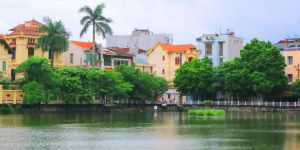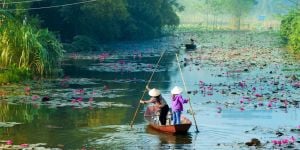To some, VN government structure an be confusing. It was, originally based on agricultural organisation of the country' facilities.
Subsequent to 1976 districts became agro-industrial economic units, acting to reorganise production, were agencies for economic planning, budgeting, and management, and as the chief political units of local government. Emphasis on this latter function has created an enormous bureaucracy. Many, if not most, provincial people's committees have in excess of thirty separate departments, and each district people's committee has had to establish an equal number of counterparts.
Makes for a way of reducing unemployment!
There are autonomous municipalities which are city-provinces with added powers. At present these include Ha No, Da Nang, Ho Chi Minh City, Hai Phong and Can Tho. They not only have the power/authority of a regular province but have also been granted additional powers unique to certain cities.
Government of an autonomous municipality consists of an elected People's Council that in turn elects an Executive Committee, headed by a mayor, and oversees numerous departments administering various activities.
Most Foreigners don't need to know the organisation structure details just that it is clone after clone of the same.
The key thing to know is that the autonomous municipalities have special powers delegated to them. Ha Noi (federal) sets the parameters and these municipalities operate within them. They are the reason they are best for Foreigners visa and permit applications.
In rest of the country, cities, towns, villages, etc. are all subservient to the provincial peoples committee.
To draw a chart of all the interconnections is almost impossible. The administrative functions are simply like a family tree. A very big family, tree that extends all the way down to neighbourhood 'solidarity' cells numbering ten to twenty families.
These special powers include immigration policies, marriage, divorce, employment, etc., which is why only certain procedures are locally determined in these cities. Of them, TP HMC is the most liberal. It is, as we all know, the biggest city. IMO, TP HCM is also the best for looking after the social and health needs of it's residents.
Quite transparent to most Foreigners is the fact that certain 'national' entities such as EVN and VNPT, actually have local operating companies at the provincial level. VNPT has several operating companies in TP HCM; EVN has a city wide operating company.
For example. Ha Noi adopted the practice of people who paint their telephone numbers on public property would lose that number. The peoples committee did this by simply telling their operating company when to disconnect numbers. Very effective.
When I established my companies they all started off in TP HCM as the support from the city is so great. They have a far better understanding of the way Foreigners think and operate. After six months, or so, I transferred the corporate entity to my province where they were satisfied with the process.
Running parallel to this massive bureaucracy, with occasional links in to the administrative hierarchy, is the security apparatus.
The security departments monitor the activities of everything down to ward members, but the departments' decisions are kept secret from the chairpersons of the various levels of executive committees. The security apparatus reports directly to Ha Noi (federal).
So when Foreigners living in 'the countryside', i.e. not the big cities, relate their experiences and/or procedures they have followed there is often a wide discrepancy between them and the experiences in the Big Three cities.
 Getting married in Vietnam
Getting married in Vietnam Traveling to Vietnam
Traveling to Vietnam Dating In Vietnam
Dating In Vietnam Making phone calls in Vietnam
Making phone calls in Vietnam Moving to Vietnam with your pet
Moving to Vietnam with your pet Driving in Vietnam
Driving in Vietnam The most popular neighbourhoods in Hanoi
The most popular neighbourhoods in Hanoi Sports activities in Hanoi
Sports activities in Hanoi



